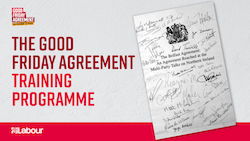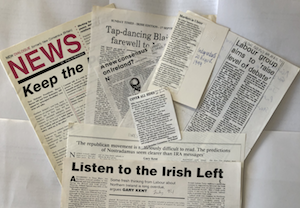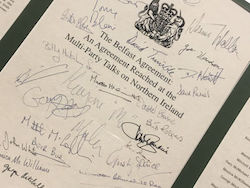GARY KENT recalls how some on the British left challenged orthodox thinking and pioneered an alternative approach to Northern Ireland that helped lay the political groundwork for the Good Friday Agreement.
The Labour Party’s new training programme to mark the 23rd anniversary this April of the landmark Good Friday or Belfast Agreement is an overdue opportunity to reflect, not just on the achievement of Tony Blair’s government, but on the contribution made by some on the British left to resolving the Northern Ireland conflict.
 It was a process in which the ILP played a positive role as it sought to understand the situation and present an alternative approach, one often at odds with much of the rest of the left.
It was a process in which the ILP played a positive role as it sought to understand the situation and present an alternative approach, one often at odds with much of the rest of the left.
When I joined the ILP in 1978 as a callow youth I had imbibed the ‘common sense’ on the left, which stated that partition was the main cause of the conflict and the answer was self-determination for the Irish people as a whole and Troops Out Now, as the slogan put it.
I even slammed the ILP leadership at my first AGM for rejecting this narrative. I then discovered what ILPers had said about partition a century ago (essentially, they recognised the reality of partition before the fact). I also read the work of contemporary ILPers such as Eric Preston, who helped to expose internment in 1971, and began to appreciate the open-minded connections the ILP fostered with Irish left-wingers who rejected the Provisional IRA in favour of class politics.
By the 1980s the ILP was in regular contact with the Workers’ Party, a group descended from the Official IRA from which the Provos had split. The WP sought to unite Protestants, Catholics and dissenters for the common good, although there was a Stalinist edge to it at times and some dubbed us ‘Trots’. I recall ILPers at a 1986 WP conference in Dublin mixing with representatives of the Soviet Communist Party and the North Korean Workers’ Party. (You can read a review of Brian Hanley and Scott Millar’s history of the Workers’ Party here.)
The ILP’s Labour Leader newspaper often carried reports of different perspectives on Northern Ireland, many written by Alistair Graham who joined the modern ILP’s first delegation to the province in March/April 1985, along with Pauline Bryan, Paul Scofield, Vince Mills and David Connolly.
The delegation met loyalist parties, the Democratic Unionist Party (DUP), the Alliance Party and the Social Democratic and Labour Party (SDLP), while the Ulster Unionist Party (UUP) refused because the ILP was also meeting Sinn Fein. Two of the figures the delegates met were later murdered by the IRA – one republican leader (an agent for the British state), and one prominent loyalist leader.
It was a year of considerable tumult in Northern Ireland – the controversial Anglo-Irish Agreement emerged that November – and the delegates’ report is a good snapshot of the conflicting opinions of the time.
Alternative views
I joined a second delegation to Belfast in 1991 that met the WP, trade union leaders, the Alliance, the SDLP, Sinn Fein and the UUP whose leader, Jim Molyneux, sat in a room festooned with pictures of the Queen and the Union Jack. The fact that he met us at all was an early sign that the UUP recognised it had to engage with British opinion rather than take it for granted.
It was two young brothers, Chris and Michael McGimpsey of the Unionist Labour Group, who ultimately took the lead in building UUP links with the British left and they became an important source of alternative views to the accepted Troops Out line in left-wing circles.
 On one occasion in 1998 Michael shared a prestigious platform with Sinn Fein president Gerry Adams at a packed Tribune rally at Labour conference. Deploying humour to great effect, he asked the audience to spot the difference between Geri Halliwell, who had just quit a famous girl band, and Adams – to which the answer was “Geri really has left the Spice Girls”. There was a sharp intake of breath followed by laughter, which completely fazed the republican leader.
On one occasion in 1998 Michael shared a prestigious platform with Sinn Fein president Gerry Adams at a packed Tribune rally at Labour conference. Deploying humour to great effect, he asked the audience to spot the difference between Geri Halliwell, who had just quit a famous girl band, and Adams – to which the answer was “Geri really has left the Spice Girls”. There was a sharp intake of breath followed by laughter, which completely fazed the republican leader.
When we met Sinn Fein in 1991, they helpfully had that day’s issue of Irish News open on the table in front of us, displaying a hard-hitting interview in which I contrasted Sinn Fein’s leftist rhetoric in Britain, where it claimed to be Marxist when it suited them, to its more conservative appeal in America, where it raised funds and sang a different tune.
I also praised the fledgling peace movement that sought to pressure all the paramilitaries to renounce violence, and explained that we were keen to challenge the simplicities of the Troops Out movement and raise the level of debate about the realities of life and politics in Northern Ireland.
Our interlocutors did give us a decent amount of time, however, even though it was Easter and the traditional republican events were waiting for them. We had accidentally turned up to the wrong office, finding a blackboard displaying coded messages to the IRA’s Belfast Brigade.
The Workers’ Party also began to have an influence and from 1985 held daily Irish social nights at Labour conference. They cannily refrained from explicit propaganda about their opposition to terrorism, but as the songs, drink and craic flowed into the wee hours, these events clearly began to change people’s minds. I remember once seeing a group in close conversation that included the Irish ambassador, the McGimpseys, union leaders and Gusty Spence, who had served 18 years in prison for activities with the Ulster Volunteer Force. It was Spence in 1994 who called a ceasefire following the IRA’s “surrender”, as he called it.
The following year the ILP held a joint conference fringe meeting with the WP at which their leading Northern Ireland figure and Belfast councillor, Seamus Lynch, spoke, alongside David Connolly. It was an early sign of changing attitudes when 120 people turned up, far more than the expected 20 or 30.
New dialogue
Back then, the ILP could hardly have known that its more thoughtful approach to Northern Ireland would have any influence on the peace process. That it did is partly due to Harry Barnes, an associate ILP member who was elected Labour MP for North East Derbyshire in 1987, when I became his parliamentary researcher.
 We began to meet campaigners against knee-capping, to support the Peace Train organisation, and helped to form a cross-party British offshoot of the Dublin-based New Consensus group, which sought to delegitimise the IRA’s false claim to speak and act for the Irish people.
We began to meet campaigners against knee-capping, to support the Peace Train organisation, and helped to form a cross-party British offshoot of the Dublin-based New Consensus group, which sought to delegitimise the IRA’s false claim to speak and act for the Irish people.
Separately, the ILP established the Socialist Committee on Ireland to counter the more nationalist-minded Labour Committee on Ireland. I and others spoke at many Labour clubs and CLP meetings as we opposed the demand for Troops Out Now that ignored the right of Northern Ireland to determine its own future.
While it was vocal, the Troops Out movement was largely hard left, led by then marginal figures such as Jeremy Corbyn, and most Labour members spurned its sneaking regard for physical force republicanism.
A wider group in the party continued to think that ending partition as quickly as possible was vital, however. They were represented by Kevin McNamara, a decent and principled man who was Labour’s Shadow Secretary of State for Northern Ireland under Neil Kinnock, John Smith and, briefly, Tony Blair. He had helped to expose the ‘Protestant state for a Protestant people’ policy of the 1960s, when gerrymandering and denial of basic rights to Catholics led to the civil rights movement, and forced London to impose direct rule and anti-discrimination policies.
His support for Anglo-Irish joint sovereignty as a direct route to unification became more and more untenable as John Major’s peace process gained legs in the 1990s. It was also in contrast to a motion passed by Labour conference in 1981 calling for “unity by consent” and recognising the need for a Labour movement in Northern Ireland. It was a fudge that allowed some to stress unity whatever and some to stress consent whenever.
Ideological battle
The process that culminated in the Good Friday Agreement began with the military exhaustion of the IRA’s campaign brought about partly by infiltration and intelligence, as well as enhanced Anglo-Irish co-operation and the growing contradiction between the IRA’s imperative to bomb businesses and Sinn Fein’s to win votes.
 Meanwhile, both the Thatcher and Major governments had adopted a more sophisticated approach. In 1989, Northern Ireland secretary Peter Brooke devised the vital formula that Britain had “no selfish strategic or economic interest” in the province. The phrase became the basis of the 1993 Downing Street Declaration by the British and Irish governments.
Meanwhile, both the Thatcher and Major governments had adopted a more sophisticated approach. In 1989, Northern Ireland secretary Peter Brooke devised the vital formula that Britain had “no selfish strategic or economic interest” in the province. The phrase became the basis of the 1993 Downing Street Declaration by the British and Irish governments.
Note, there is no comma between ‘selfish’ and ‘strategic’, which would have changed its meaning entirely, denoting complete indifference rather than neutrality. Republican and unionist opponents often inserted the comma as a way of encouraging and scaring their supporters.
In this context, Labour’s a priori and romantic attachment to unification stood out like a sore thumb. Indeed, Major’s peace process was weaker without Labour support. Unionists could not endorse a process that wasn’t backed by a party hoping to form an alternative British government as they feared being trundled against their will into a united Ireland.
ILP members played a prominent part in the ideological battle to change Labour’s position through articles and letters in the liberal and left press. I made the case for neutrality in a Tribune piece published during Labour’s 1994 leadership campaign, arguing that: “Labour must now reassess its Northern Ireland policy and listen to the Irish left. It could better promote peace and reconciliation in Ireland if neutrality on the border was combined with a comprehensive peace package that addressed all the causes of the conflict.” The New Statesman and the Mirror also altered their editorial views on Irish unity.
McNamara and his supporters stuck to their guns, however, until September 1994 when the newly elected Labour leader, Tony Blair, cut the ground from under their feet, abruptly replacing McNamara on a Today programme interview to announce that Labour had changed its policy to neutrality on the border and bipartisanship on the peace process.
The Downing Street Declaration, he claimed, “almost overtook all the historical positions of all parties … [and] puts the whole of the future of Northern Ireland in a different context … [meaning] that it is for the people of Northern Ireland to determine their future.”
Revisionist challenge
McNamara was duly replaced by Mo Mowlam who made her first public speech to the Cleveland-based New Dialogue group, which Harry and I had founded with Bert Ward, a refugee from the Communist Party’s hardline Ireland advisory committee.
Bert and Mowlam used to walk together along the beach at Redcar. He was a very persuasive working class intellectual who had seen through the outdated illusions of many on the British left. Meanwhile, Harry often argued the toss against Ken Livingstone, Corbyn and others in the Socialist Campaign Group of MPs.
At the start of this revisionist challenge, no one could know how easy or hard it would be to shift the ground. The hard-left line seemed entrenched but it soon became obvious there was little wider support for it, just inertia. The old consensus was slowly broken as a tougher peace movement, trade union action and women’s groups began to appeal to a broader audience.
It’s difficult to know what swayed Blair’s thinking; childhood trips to his mother’s birthplace in Ireland gave him much hinterland. But I believe he deserves great credit for the time he put into ending the Troubles, something hard to accept for those left-wingers who cannot bear Blair and pile all the praise on Mowlam.
Mowlam was important, of course. A brave, bundle of energy who didn’t suffer fools gladly (as I found out once), she was certainly a vital part of the team, while she also helped kill off sloppy left-wing thinking. Her death was a tragic loss to Labour.
The British Labour movement’s eventual embrace of reality was clearly a factor in bolstering the peace process and enabling Labour’s huge achievement in securing the GFA. Many people are alive as a result. Education and housing are still segregated, and bifurcated politics still haunts Northern Ireland, but it is undoubtedly a better place.
The ILP can be proud that its active refusal to toe the outdated and sometimes immoral lines of left-wing thinking contributed to this in some small way. In the end, intellectual challenges to dead dogmas did cut through and those ILPers who saw the bigger picture with moral clarity helped to make history.
—-
Gary Kent has been a Labour Party member since 1976 and has worked in Parliament since 1987. He was secretary of the Socialist Committee on Ireland and now focusses on Iraqi Kurdistan where he is a columnist, a director of a training agency and a visiting professor.
More on the Labour Party’s education campaign about the Good Friday Agreement is here.



20 April 2021
In leaving the EU Boris Johnson gave the UK parliament only a last minute choice: accept his deal or leave on a disasterious ‘No Deal’ basis. The deal itself provided for the mess that now exists over the trading arrangments which we have with Northern Ireland. The current crisis rests upon the shoulders of the EU and, in particular, on those of our own and the Irish government. The UK and Ireland should have worked for a deal which kept Northern Ireland in its past UK trading relationship. Instead, Boris helped to place us in a position where the conflict in Northern Ireland is returning.
8 March 2021
Here is another serious Northern Ireland issue which needs to be tackled.
8 February 2021
Harry Barnes skilfully used his parliamentary platform and regular articles, for instance, to champion human rights groups, focus on those on the run from the paramilitaries, save lives, persuade John Major to publicly accept that those killed on Bloody Sunday were not guilty, highlight the importance of integrated education, and help unions.
His championing of a Northern Ireland Select Committee inquiry into paramilitary fund-raising did much to expose their sophisticated network of property ownership and skimming from sources as wide as pubs, one arm bandits, and more.
Likewise, the British-Irish Interparliamentary Body, later the British-Irish Parliamentary Assembly, which I attended about 20 times over a decade or so as a writer, did much to build relations between MPs in these islands. Northern Ireland unionists originally boycotted it on the mistaken grounds that it was part of the hated Anglo-Irish Agreement but eventually joined, thanks in part to Harry making the case.
Once frosty and even toxic, relations between Irish and British MPs thawed considerably and enhanced the wider co-operation in security issues that allowed the Irish and British governments to win and implement the Good Friday Agreement. Brexit makes the work of the Assembly even more important.
The ILP’s initiative from the 1970s onward played a critical role. Additionally, the ILP’s initiative in spotting the dangers of the Poll Tax to working class communities and electoral registration, before the Labour Party cottoned on, was the basis of hectic activity by Harry, me and others in forming London against the Poll Tax and a national federation of groups. We sought to build a broad movement that didn’t fetishise the tactic of non-payment, as revolutionary groups did for the purpose of identifying and recruiting potential cadres.
It also prompted Harry to do the hard work of devising a new electoral registration system via a Private Member’s Bill which was eventually adopted by the Labour government in 1997.
Oaks grow from acorns and the ILP seeded quite a few. The trajectory could not have been predicted but the ILP made a real difference.
8 February 2021
Another ILP publication on Northern Ireland from that period was Alistair Graham’s 1976 pamphlet ‘Northern Ireland: The Unsolved Problem – From Civil Rights to Sectarianism’.
You can find that here.
8 February 2021
Gary Kent provides an impressive review of the ILP’s role in seeking a peaceful and democratic solution to the conflicts in Northern Ireland.
In 1971, before the period that Gary Kent covers, the ILP sent two members of its national committee to look more closely at what was taking place. The result was a remarkable book, “Belfast August 1971” by Eric Preston and Danny Kennally.
You can find it here.
6 February 2021
Although I did not participate in the ILP’s delegation to Northern Ireland in 1985, I carefully followed its approach from that period. Then in 1987 I became an MP and within 18 months made my first ever visit to the Province, addressing a fringe meeting run at the Workers’ Party annual conference in Belfast.
In the 1992/3 session I started a lengthy parliamentary involvement with the British-Irish Parliamentary Body which held annual get-togethers in both Britain and Ireland. I also joined one of its sub-committees which met in Northern Ireland. I became vice-chair of the Labour Party’s backbench committee on Northern Ireland, but had a dfferent standpoint to its chair – Jeremy Corbyn. I also regularly attended and participated in Northern Ireland debates in the Commons. In 1997 I was appointed as a member of the Commons Northern Ireland Select Committee, later becoming its vice-chair.
Gary Kent spells out a number of our other activities around issues affecting arrangements in the island of Ireland. Outside of constituency issues and key passiing events, such as the Poll Tax, Irish issues were near the top of my agenda – thanks to the ILP’s initiative.
Then, just as the Peace Agreement seems to have moved us into relative peace and tranquility, we now have blockages between Britain and Northern Irish trade arising from our departure from the EU. Labour’s current parliamentary spokesperson on Northern Ireland is a neighbouring MP of mine, so it is time to go back to the drawing board for all of us.